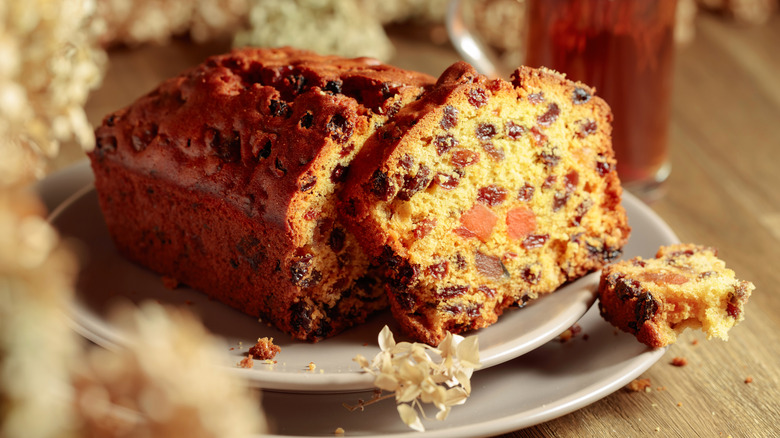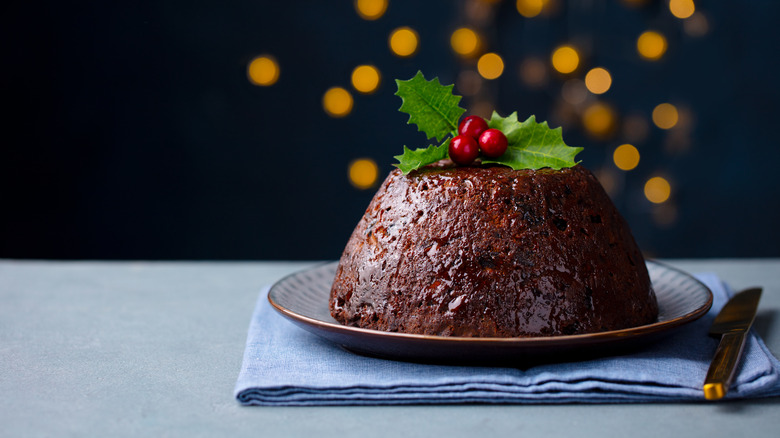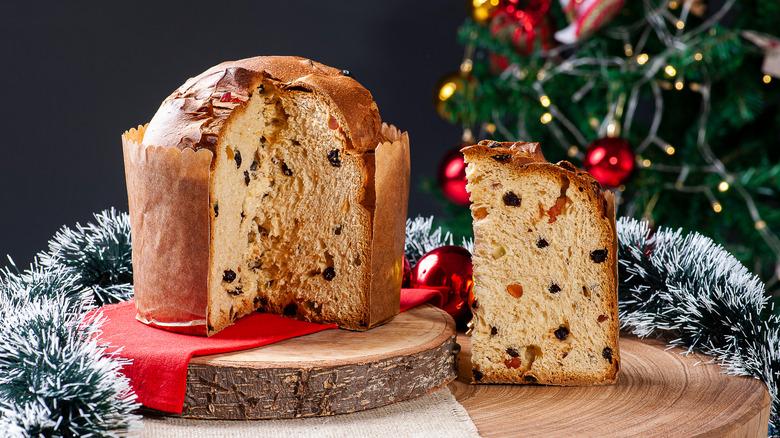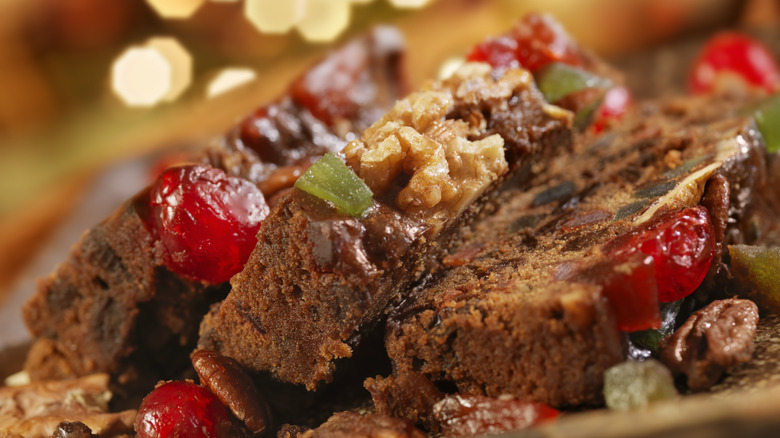The Storied History Of Fruitcake: The Christmas Dessert People Love To Hate
In one fell swoop, late-night talk show host Johnny Carson triggered the modern-day demise of fruitcake. During an episode of "The Tonight Show" the late comedian famously quipped, "There is only one fruitcake in the entire world, and people keep sending it to each other." Viewers laughed. Fruitcakes became a punchline. In an instant, fruitcake morphed from a beloved seasonal tradition to the butt of jokes about its heft and longevity; ironically, the very same qualities that had rocketed it to its leading place among 20th-century holiday desserts.
Balk if you will, but Carson's words had staying power. In another much-chronicled incident, a one-line joke of his triggered a nationwide toilet paper shortage. Consider this: Just a few years prior to Carson's joke heard 'round the world, The Los Angeles Times featured the maligned confection in an article headlined "Fruitcake is a Holiday Must." The December 1953 article advised baking fruitcake early in the season because "well-aged cakes have a wonderfully soft, tender texture" while noting that curing the cake allows flavors to settle into "fragrant, subtle richness."
So how did we go from intentionally aging and nurturing fruitcake so it develops the nuanced — and beloved — flavors of sugary fruit and spice, to harping on its weight (some would say rich density) and extended shelf life (achieved by steadfastly curing the cake with rum or brandy over a period of weeks or months)? It's a long story that begins during the days of the Roman Empire.
Tracing fruitcake's roots
In ancient times, an early precursor to modern fruitcake emerged in the form of a battlefield snack made from barley, honey, wine, and dried fruit created to provide a simple, ready-to-eat meal for soldiers a little too busy to cook a traditional meal. Granted, those early incarnations of what eventually evolved into the fruitcake we know today were a bit rough around the edges — and probably as dry as sawdust — but as Roman soldiers moved through Europe and eventually into Britain, the energy bar-like snack became more refined. By the early Middle Ages, the cake chock-full of fruits and nuts had become a mainstay among the European continent's social elite. Spices like cinnamon, cloves, and nutmeg were luxuries afforded primarily by the monied class, turning the one-time battlefield snack into a symbol of sophistication. Gradually regional differences, driven by local preferences and available ingredients, began to emerge. Still, at its core fruitcake remained a bread-like cake riddled with dried or candied bits of fruit and doused in alcohol.
Germany's version of fruitcake, stollen, is a fruit-filled yeast bread. In Italy, panettone is a lighter confection that's sometimes likened to brioche. Great Britain's Christmas cake (sometimes called plum cake) is a 16th-century derivation of Christmas pudding. It's a dense, fruit-filled cake made by adding flour and eggs to leftover pudding. When it's done right, American fruitcake has more in common with British Christmas cake than its continental cousins. The similarities make sense given that British settlers introduced the confection to North America.
One-size-fits-all gift
In North America, settlers began preserving the summer fruit harvest by crystallizing it in sugar syrup. The innovation made it possible to incorporate the bright colors of summer fruit into wintertime confections — a factor that likely played a role in earning fruitcake its place at the center of festive holiday tables. Plus, due to its boozy nature — even the Romans spiked their battlefield snacks with wine — fruitcake has a long shelf life. (Alcohol deters the growth of yeast and mold.) For centuries, home-made fruitcake held its place as a staple of Christmas festivities, celebrated for its rich texture and aromatic spiciness. Then progress came knocking. The 1913 introduction of parcel post delivery made it possible to send home-made fruitcakes to friends and relatives far and wide. Fruitcake became synonymous with holiday gift-giving. Its long shelf life and compact size made it the darling of the burgeoning mail-order food business. In fact, two of the longest-running mail-order food businesses in the United States — Claxton in Georgia and Collin Street Bakery in Texas — built their empires on mail-order fruitcake.
With legacies spanning more than a century — and with their versions of the ubiquitous Christmas confection still in demand — both businesses must be doing something right, but not all mail-order fruitcakes are equal. Other purveyors cut corners resulting in lower-quality cakes. Over time, fruitcake garnered a reputation as an easy-yet-thoughtless Christmas gift. Jokes about using fruitcake as a doorstop or regifting the same cake for decades became the norm.
Try it, you'll like it
The thing is, some of fruitcake's most outspoken 21st-century detractors have never even tasted the real deal. A 2012 article in Jezebel summed it up, "Basically, people just hate fruitcake because they've been taught to hate fruitcake." And even those among us who have tried store-bought fruitcake, are probably missing out. As Virginia Glass, a self-proclaimed fruitcake connoisseur, told Thrillist in 2018, "Mass-produced fruitcakes, the kind that most people are exposed to during the holidays, are nothing like what a fruitcake should be."
Glass does things the old-fashioned way. She makes her homemade fruitcake with single-barrel Scotch, golden raisins, dried sour Michigan cherries, diced dried apricots, candied orange peels, and honey with dark brown sugar. When it's done right, the pay-off for the time-consuming effort is a rich, dense, moist cake bursting with a flavorful symphony of fruit, spice, and alcohol. It should never be dry and crumbly.
"Here's where I think it all went wrong: It's those goddamn red and green glacé cherries," Glass added. "I don't know what they are. But they bear no resemblance to real fruit." She might be onto something. Remember that 1953 article in The Los Angeles Times? It suggested bypassing the time-consuming process of soaking dried fruit by using store-bought diced glacé fruit. Convenient? Sure. But at what cost? Here's a little food for thought: Before hopping on the I-hate-fruitcake bandwagon based on hearsay or experience with store-bought cakes, do yourself a favor and try a slice of the real thing.



